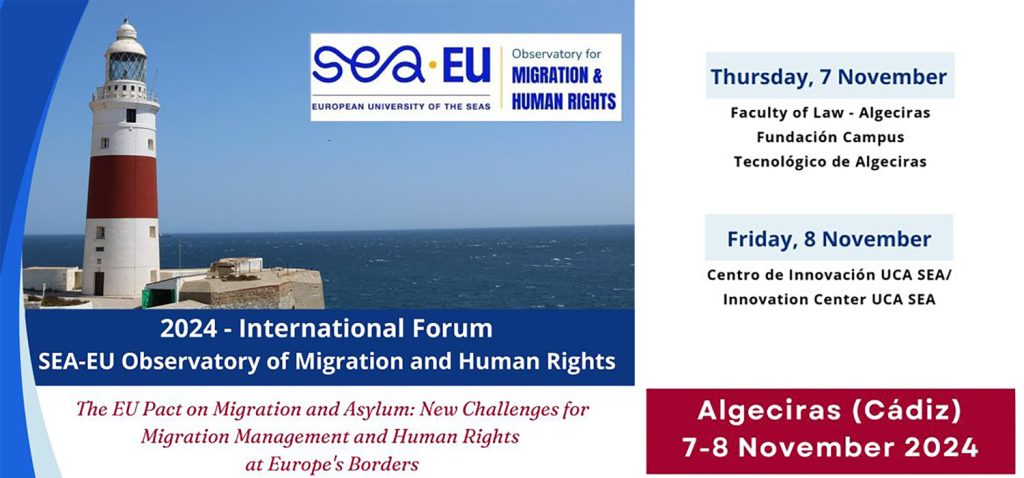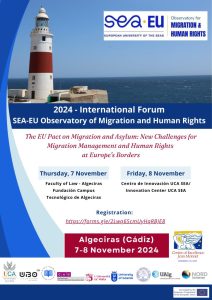2024 – International Forum SEA-EU Observatory of Migration and Human Rights. “The EU Pact on Migration and Asylum: New Challenges for Migration Management and Human Rights at Europe’s Borders” 7 noviembre 2024
The 2024 International Forum of the SEA-EU Observatory of Migration and Human Rights “The EU Pact on Migration and Asylum: New Challenges for Migration Management and Human Rights at Europe’s Borders” will consist of two days of roundtables and conferences hosted by the SEA-EU Observatory of Migration and Human Rights members and open to other interested participants. Given the recent adoption of the EU Pact on Migration and Asylum, the central topic of the 2024 International Forum of our SEA-EU Observatory will address the implications of the new proposals related to international protection and the management of migratory flows for the respect of human rights in the European borders.
On 14 May 2024, after four years of negotiations between Member States and European institutions, the EU Council adopted the Pact on Migration and Asylum. A myriad of instruments were adopted to incorporate new processes to manage the arrivals of migrants in an orderly manner, create efficient and uniform asylum procedures, and ensure a fair and solidary distribution of the burdens among European States. The 2024 SEA-EU OMHR International Forum will discuss key aspects of the 2024 Pact on Migration and Asylum, including a unified border procedure for asylum seekers, a flexible solidarity mechanism for Member States, and new concepts of “migratory crisis” and “instrumentalisation of migration”. These updates pose significant human rights challenges in managing migratory movements, affecting both asylum procedures and the reception of migrants and refugees at Europe’s external borders.
The SEA-EU Observatory of Migration and Human Rights:
The SEA-EU Observatory of Migration and Human Rights was established in 2019 as a forum for multidisciplinary dialogue and debate to analyse all aspects related to immigration and the protection of fundamental rights in coastal Europe. A key binding factor that unites the Universities of our SEA-EU consortium, in addition to the sea, is that all of them are located in cities, territories, or States with external maritime borders or external port borders.
For this reason, the Observatory of Migration and Human Rights allows us to unite ties and efforts from higher education to forge common identities in matters that affect us similarly due to our border condition: border control policy, immigration, asylum and human rights. In this vein, the two main areas of interest of the SEA-EU Observatory of Migration and Human Rights are:
- . Immigration, refugees, borders and human rights in International Law and the Migratory Policy of the EU;
- . Diversity and Social Justice.
Call for contributions:
The 2024 International Forum of the SEA-EU Observatory of Migration and Human Rights will be held on 7th and 8th November 2024, presence-based in Algeciras Campus, University of Cádiz. Interested members and SEA-EU lecturers/researchers are invited to propose a contribution for an oral presentation during this event (expected length: around 10-15 minutes). The contribution can address the members’ starting or ongoing research in line with the thematic defined by the observatory. Interested members are kindly requested to submit an abstract (maximum 300 words) before 15 October 2024 through this link:
Register here for attendance and oral presentations:
https://forms.gle/2Lwq65cmUyHqRBJE8



